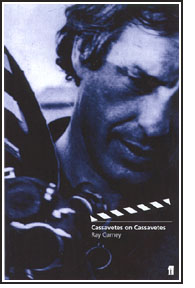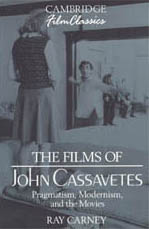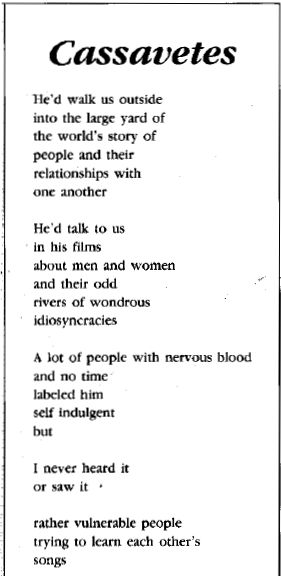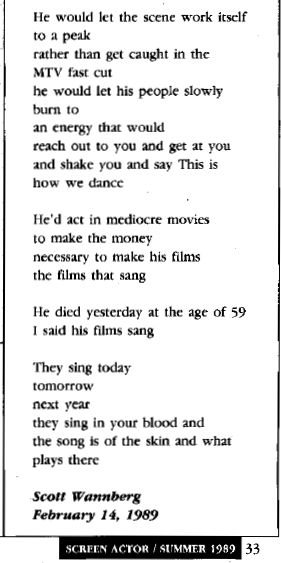 Ray Carney replies: Lucas Sabean recently sent me a quote from D.H. Lawrence that can stand as a response to Sean Plunkett's observations above:
Ray Carney replies: Lucas Sabean recently sent me a quote from D.H. Lawrence that can stand as a response to Sean Plunkett's observations above:This is only the "To Print" page. To go to the regular page of Ray Carney's www.Cassavetes.com on which this text appears, click here, or close this window if you accessed the "To Print" page from the regular page. Once you have brought up the regular page, you may use the menus to reach all of the other pages on the site.
A note from Ray Carney: The following letter continues the discussion begun on the previous Mailbag page 83 (accessible via the blue page number menus) about the awfulness of American film appreciation.
Subject: Film audiences and reviewing
I saw you were having an open discussion on the subject of film audiences and reviewing and why they are so preoccupied with predictable, big budget Hollywood films whilst being indifferent to anything more challenging of left of field. I don't know if I'll be able to tell you anything you don't know already but here's my two cents all the same.
Let's start with audiences. When I was around 17, I went to see Along Came Polly, a likeable but fairly tired comedy with Ben Stiller and Jennifer Aniston. I was still in school and I wasn't really familiar with any independent film makers like John Cassavetes or Abbas Kiarostami. All the same I would have considered myself a serious film watcher, as well as having made a few films. I was in the middle of watching the film when I said to myself, "I know how this is going to end. Ben Stiller's going to learn to be a better man and he'll get the girl." How did I know this? Because that's how every romantic comedy seems to work out, particularly ones with Ben Stiller in them. It really annoyed me when I realised that the film wasn't trying to be any different to any other romantic comedy. In fact, it was making a point of being the same as every other comedy: quirky and eccentric on the surface but ultimately cosy and safe. You'll leave the cinema with a smile on your face. Later on that day I decided that I don't want to watch films like this. I like to think that was a smart choice.
But it still annoyed me not only that the film was so predictable and so easily categorised but that it was clearly making an effort to be like that. Why would any film maker want to do this on purpose? Then a couple of years later I was working in a video store for the summer and it all came home to me. People would come up to the counter asking for advice on what films to rent and they almost always asked either for a comedy, a thriller or an action movie. I was genuinely surprised how many people choose their viewing based on genre. I even recommended The Constant Gardener to one woman and she angrily returned it the next day, saying, "You said it was a thriller!" Personally I liked that film for the very fact that it was more than a thriller but I realised that most people really don't demand anything more from a film than that they can kick back and laugh, or they can get sucked into the complex plot, or be wowed by the car chases and action sequences. Even if it's something incredibly silly and the audience knows that it's silly, they still like it because they're getting what they expected, they're getting something familiar. To cut a long story short: when they go to see a Ben Stiller comedy, you had better give them a Ben Stiller comedy. What still gets me is that the very thing I disliked about Along Came Polly, its lack of ambition and challenge for the audience, is the very thing a lot of people love about that movie, and lots of other movies. And Hollywood film makers simply respond to this. It's one vicious cycle.
That's my opinion about audiences but how about reviewers. They watch so many films, don't they ever get bored with it all? Are they never tempted to say that a film like Along Came Polly is not sophisticated and witty, it's just lazy and it shows how little Hollywood thinks of its audience. They may well be tempted but they never do it. Why? Well, Roger Ebert has a story that somebody once sent him a letter telling him to keep his opinions out of his columns. That says it all. People get riled when reviewers steer them towards films they don't like, or criticise films that they did like. And what do people do? They say, "I'll never read that reviewer again, he only gave that film two stars." This becomes a matter of particular importance if it's a magazine that's purely dedicated to film, because people stop buying the magazine altogether. So reviewers turn into unscrupilous politicians: they have no opinions of their own, their opinions are only a reflection of the public's opinions. Politicians do it to stay in power, reviewers do it to keep their job. It's the same thing. You asked of reviewers, "Is that logic circular -- or self-serving?" I suspect you knew the answer to this question before you asked it, No, it's not circular or self-serving. It's circular AND self-serving.
I'm always disappointed how little most people demand of film, and indeed of art generally. They so readily choose the familiar over the new and potentially confusing. It's like Bob Dylan said, Why must you hate what you don't understand? Having said all that, I'm not that cynical about audiences. And I don't think that the public's indifference, or indeed resistance, to brave and originals films should be a reason for film makers to give up. Nor should the cowardice of most reviewers. On the contrary, it's all the more reason to stand up and be heard. It can be a pretty thankless task but it's really so important for film makers and film reviewers to simply be themselves and occassionally not give the audience what they want. You might not start a revolution but you'll hopefully make the odd person stop and think, if nothing else. And that's more than most Hollywood films do.
Sean Plunkett
 Ray Carney replies: Lucas Sabean recently sent me a quote from D.H. Lawrence that can stand as a response to Sean Plunkett's observations above:
Ray Carney replies: Lucas Sabean recently sent me a quote from D.H. Lawrence that can stand as a response to Sean Plunkett's observations above:
"Freedom! Most slaves can't be freed, no matter how you let them loose. Like domestic animals, they are, in the long run, more afraid of freedom than of masters: and freed by some generous master, they will at last crawl back to some mean boss, who will have no scruples about kicking them. Because, for them, far better kicks and servility than the hard, lonely responsibility of real freedom." --D.H. Lawrence
And anyone who doubts the truth of Sean's (or Lawrence's) words need only look at the box office receipts of recent American summer movies. Friends dragged me to The Bourne Ultimatum a few nights ago. This is the big hit of the summer. This is the movie everyone has seen. What a depressing experience. It's clear that audiences prefer a two-hour rollercoaster ride to meeting interesting people and learning something about life. That's America. Shock and awe and bullets in Iraq take the place of actually learning anything. And, even worse, the reviewers then rally to support the whole insane, destructive, wasteful system. Millions of dollars spent on dreck designed to distract us from facing reality, from dealing with the real issues of life. Read David Denby's review of The Bourne Ultimatum in the current issue of The New Yorker. He writes half tongue-in-cheek; he makes jokes about the movie; but, in the end, he treats it as a fun, entertaining experience and sends his readers off to see it. Is this the best that we can expect of criticism? Is this all we want from our reviewers? What has happened to moral outrage in this culture? Why are we so afraid of saying hard words about awful, hateful, wasteful things? Why are we so afraid of real art? So afraid of truth-telling? Why do we prefer the formulas, the recipe-films, the genre films Sean Plunkett writes about? Why are we so resistant to learning something new--in a film or from a review? -- R.C.
For more on this topic, see the following letter from Maddie Mattheu:
Subject: Your adoring fans.....
While trying to defend my dislike of Paul Thomas Anderson against a guy who was expressing a passionate love for Magnolia, I posted a link to an interview you did with Moviemaker magazine. His response:
I've read his opinions. I think he's a self righteous asshole.
He lost me when he dismissed David Lynch.
The only film critics I read are Ebert, Peter Howell, and sometimes Jonathan Rosenbaum. I'm fairly disinterested in getting sucked into the snobbery of high brow/pretentious/avante gard film criticism.
This is the same guy who posted this about the Matrix Trilogy:
I created this thread to address two things:
1)A number of people have listed the Matrix 1 as one of their favourite films.
It was suggested that a thread be created, which would enter around the philosophies and concepts of the Matrix.
2) Anyone who has any issues/problems with the Matrix sequels name them. All of them.
I will address each and every one of them; however, I am not interested in forcing anyone to recognize the sequels for the brilliant films they are. I simply wish to address the myriad of illogical misconceptions that surround the qualitatively superior sequel films. But. If you ARE aware of the comprehensiveness and brilliant intricacies of the trilogy's narrative overture, but you still dislike Reloaded and Revolutions......I realize I can say nothing that will persuade you otherwise.
Maddie Mattheu
RC,
You wrote: "On the basis of "The Bourne Ultimatum," "Superbad," "High School Musical," and the iPhone, I'd say that the prediction has come true. The amount of money, time, emotion, and journalistic coverage devoted to them demonstrates that it is not only our lives that are impoverished, but even our fantasies of an alternative. What has happened to us? Why is American culture this way? Why do journalists and cultural commentators continue to support the whole rotten system?"
A few thoughts in response:
As long as we're busy being distracted by being entertained, we don't know we've had the proverbial wool pulled over our eyes while our souls (not to mention lots and lots of cash, our imaginations and loss of values and ethics for starters) have been picked from our pockets. And not even missed!
As the old saying goes, there's a sucker born every minute. America's been suckered, and willingly at that. And it doesn't even know it, it's too busy enjoying the show! It's all about enjoying the show, right, the greatest show on earth?
Marty
A note from Ray Carney: A former student of mine, Dan Jones, offers his views on the subject in his blog. I recommend it. See below. --R.C.
From: "Dan Jones"
Subject: what's wrong with America, etc
Hi, Ray:
I wrote kind of a lengthy response to your question. I think I'm taking up too much space in your mailbag recently, so I'm just sending you the link.
I'm defending my dissertation next Thursday. Soon, I will be the guy in the warehouse with a PhD!
best wishes,
dj
Mr. Carney:
Even though I'm not in any way shape or form a film critic, I can't resist giving you my personal review of The Bourne (I mean Boring) Ultimatum. I got dragged to it too, and since the house was totally packed, was forced to sit in the second row. Personally, I wanted to bow out, but my "no" was not taken for an answer. I had no idea what was going on for most of the movie which was blurs being replace by other blurs, accompanied by a cacaphony of loud and obnoxious sound effects - pow!! wham!! bam!! Rrrrrrrr.... CRASH! Rrrrrrrr.... Crunch!!! Screech!!!! CRASH!!!!!! I think that about sums it up. A life-changing experience (as in stay away from "action" Hollywood films permanently - wait a minute, I think I had that reaction after seeing Total Recall years ago, as in this was hell and I was in it, I kept dozing off to see the same bloody action scene replayed over and over again, I thought it would never end), it gave me a raging headache. I don't really remember anything about it at all, did I leave anything out???
Margaret J.
Ray Carney replies: Needless to say, I agree. You say the obvious. But show me one review in a major American magazine or newspaper that dares to say what you do. How did our reviewers get so cowardly, so afraid of alienating the studio publicists? Or are they really so stupid as not to see what you point out?
I have my own answers to some of these questions as well as other reflections on the cravenness and market-centeredness of film reviewers on this page of the site (as well as on other site pages that are linked from the previous page of the Mailbag, page 83), but I would invite other responses from site readers. I will publish the most interesting. --R.C.
Subject: criticizing critics
Mr. Carney:
A few dispatches from the dumbing down of American cinema --
Item No. 1: One weekend in the summer of 1984, I remember hearing on the radio that 25% of all movie screens in the U.S. were playing Steven Spielberg productions -- Indiana Jones & the Temple of Doom (which he directed) and Gremlins (which he produced). Both were terrible films, and I fully expected the American viewing public to embrace both films. What saddened me was that film critics for the most part were highly supportive (two thumbs up, 4 stars, whatever). Time magazine (Richard Corliss, I think) called Gremlins "visually, the densest film of the decade" and devoted a number of pages to what is basically a movie with elaborately decorated sock puppets. USA Today said Summer 1984 was the best summer of all time, what with such all-time classics as Karate Kid, Sixteen Candles and Purple Rain plaguing the multiplexes and malls. Meanwhile, Bresson's L'Argent played on one or two screens, then disappeared -- probably to make way for more Spielberg productions.
Item No. 2: I live in Reno, and here's an indication of how Cassavetes films played in "the sticks." In 1975, A Woman Under the Influence played here for a week or two (due to Oscar nods, no doubt). In 1976, Killing of a Chinese Bookie played for a week (the film did have the marketable hook of nude strippers). In 1978, Opening Night, ahem, never opened in Reno, a city of 150,000 at that time.
Item No. 3: Remember the good old days, the pre-Star Wars days, when the only people who paid attention to box office figures were members of the film industry. Nowadays, the average man on the street (or in the parking lot of Wal-Mart) can recite the per-screen average of Transformers and Rush Hour 3.
What's the solution? Simply say "no" to the marketing machine of Hollywood. "No" is a wonderful concept, and it works. I know I can't change the film industry, but I can change myself. I can take control of my choices. Instead of spending $10 on Bourne and another $10 on Transformers, I'll spend $20 on a Godard DVD.
A new school year is upon us -- we're all perpetual students, and we all must keep exploring.
Sincerely,
Bob Ellis
 RC replies: Thanks for the documentation, Bob. Very interesting. Your observations and memories remind us that the good old days weren't necessarily so good -- or very different from today. Richard Corliss's rhetorical contortions to praise the "visual density" of a sock-puppet movie in Time magazine are indistinguishable from David Denby's praise of The Bourne Ultimatum's jittery, jiggly, frenetic editing in The New Yorker. The more things change, the more they stay the same. Neither the movies nor the reviewers are any better -- or any worse -- than they were twenty years ago.
RC replies: Thanks for the documentation, Bob. Very interesting. Your observations and memories remind us that the good old days weren't necessarily so good -- or very different from today. Richard Corliss's rhetorical contortions to praise the "visual density" of a sock-puppet movie in Time magazine are indistinguishable from David Denby's praise of The Bourne Ultimatum's jittery, jiggly, frenetic editing in The New Yorker. The more things change, the more they stay the same. Neither the movies nor the reviewers are any better -- or any worse -- than they were twenty years ago.
A question: Why do reviewers do this -- find something to like in junk, I mean? Is it a way of denying their own self-loathing, the feeling they would otherwise have that they are wasting their lives watching and writing about Hollywood junk? Is it out of fear for their jobs -- a desire not to alienate their readers and their editors who both probably like the junk? Is it cowardliness -- a feeling that if so many people actually pay money to see something like The Bourne Ultimatum that a reviewer doesn't dare criticize the movie or the people who pay to see it? Or is it just stupidity -- a case of not seeing what movies like this are doing to our culture, or what they tell us about ourselves?
Tom Noonan said we should boo at the end of movies we don't like, so that others don't feel they are the only ones there who haven't been enjoying the experience. We might discover that we are not alone, that almost everyone in the theater thought the movie stunk. Would that make a difference? Sign me up as a member of the boo club. Let's boo all the bad ones and see if others join us. The results might be surprising.
RC
A note from Ray Carney: A good friend and actor, Michael Gnat, sent me the following clipping that appeared in Screen Actors magazine the summer after John Cassavetes died. It is worth considering in the context above. Cassavetes made the kind of movie that reviewers weren't afraid to pan, to criticize, to say bad things about. Why were they so brave when it came to attacking the work of a genius when they are so cowardly about saying anything bad about the work of a hack?


This is only the "To Print" page. To go to the regular page of Ray Carney's www.Cassavetes.com on which this text appears, click here, or close this window if you accessed the "To Print" page from the regular page. Once you have brought up the regular page, you may use the menus to reach all of the other pages on the site.